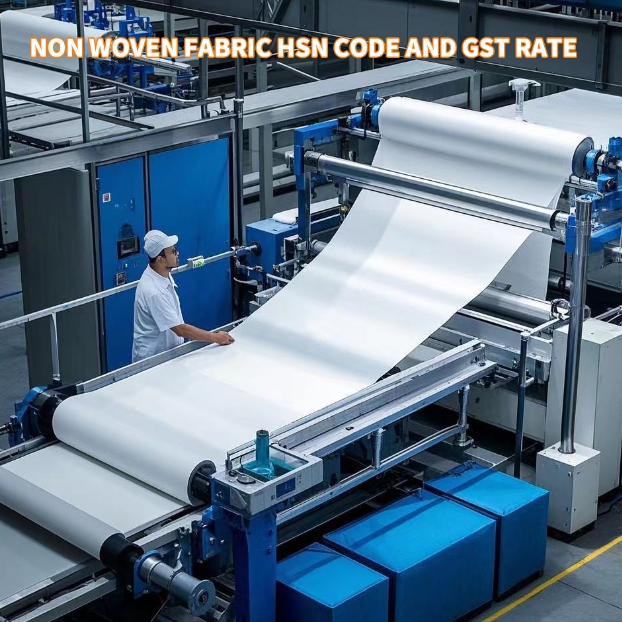In international trade, it is essential to understand various systems and regulations that govern the movement of goods across borders. Three of the most important components in this regard are HS Code, HSN Code, and GST Rate. These classifications and tax rates. For non-woven fabric, the HS code falls under Chapter 56: Non-Wovens, Whether or Not Impregnated, Coated, Covered, or Laminated. Understanding the correct HS code for your non-woven fabric products can streamline customs procedures and minimize errors in international trade.

What is HS Code?
HS Code, short for Harmonized System Code, is a globally standardized classification system used for identifying products in international trade. It is maintained by the World Customs Organization (WCO), which is responsible for the classification and harmonization of trade codes. The HS Code is used by governments, businesses, and customs authorities to ensure uniformity in the classification of goods and to streamline customs processes.
Structure of HS Code
The HS Code is a 6-digit code, but countries may extend it further for specific products (e.g., 8-digit or 10-digit codes) to suit their national requirements. The first six digits are universal, while the additional digits vary by country.

- First 2 digits: Represent the chapter (major category) of the product.
- Next 2 digits: Represent the heading (sub-category).
- Next 2 digits: Represent the subheading (specific product details).
For example, the HS code for non-woven fabrics is 5603. and 25gsm pp spunbond non woven fabric hs code is 5603919000.
What is HSN Code?
HSN Code, or Harmonized System of Nomenclature Code, is a specific term used primarily in India to classify goods for the purpose of taxation under the Goods and Services Tax (GST) system. The HSN system is based on the same international classification system as the HS Code but is adapted for Indian tax purposes. HSN codes are used to categorize goods for GST filing, ensuring consistency in the application of tax rates.

HSN Code vs. HS Code
- The HS Code is an international standard, while the HSN Code is the Indian extension used to simplify tax compliance.
- The HSN Code is used for tax purposes in India and generally extends to 8 or 10 digits, depending on the product category, compared to the 6 digits of the international HS Code.
HS Code Breakdown for Non-Woven Fabric
Below is a breakdown of the specific sub-categories under HS Code 5603:
| HS Code | Description | Weight Range |
|---|---|---|
| 5603.11.00 | For nonwovens weighing less than 25 g/m² | Less than 25 g/m² |
| 5603.11.00.10 | For nonwovens coated, covered, or impregnated with a material other than rubber, plastics, wood pulp, or glass fibers | Less than 25 g/m² |
| 5603.12.00 | For nonwovens weighing more than 25 g/m² but not more than 70 g/m² | 25 g/m² – 70 g/m² |
| 5603.13.00 | For nonwovens weighing more than 70 g/m² but not more than 150 g/m² | 70 g/m² – 150 g/m² |
| 5603.14.10 | For nonwovens weighing more than 150 g/m² that are coated or covered | More than 150 g/m² |
| 5603.14.90 | For nonwovens weighing more than 150 g/m² that are not impregnated or laminated | More than 150 g/m² |
| 5603.94.9010 | For nonwovens that are not man-made, weigh more than 150 g/m², and are not floor covering underlays or laminated fabrics | More than 150 g/m² |
HSN Code for Non Woven Fabric
Non-woven fabrics are categorized under HSN or HS Code 5603, which is further subdivided based on the material composition and weight. Below is a detailed breakdown:
| HSN Code | Description | Weight Range |
|---|---|---|
| 5603.11 | Non-wovens made of man-made filaments | Not more than 25 g/m² |
| 5603.12 | Non-wovens made of man-made filaments | 25 g/m² – 70 g/m² |
| 5603.13 | Non-wovens made of man-made filaments | 70 g/m² – 150 g/m² |
| 5603.14 | Non-wovens made of man-made filaments | More than 150 g/m² |
| 5603.91 | Non-wovens made of other materials | Not more than 25 g/m² |
| 5603.92 | Non-wovens made of other materials | 25 g/m² – 70 g/m² |
| 5603.93 | Non-wovens made of other materials | 70 g/m² – 150 g/m² |
| 5603.94 | Non-wovens made of other materials | More than 150 g/m² |
GST Rate for Non-Woven Fabric
The applicable GST (Goods and Services Tax) rate for non-woven fabric in India is as follows:
| HSN Code | Description | GST Rate |
| 5603 | Non-woven fabrics, including laminates | 12% |
It is essential to verify the GST rate with the latest government notifications, as tax rates may vary based on product usage and specific exemptions.
Why is HS Code Important for Non-Woven Fabric Trade?
- Simplifies Customs Procedures: Correctly classifying your products under the appropriate HS code ensures faster customs clearance.
- Avoids Penalties: Misclassification can lead to fines or rejection of goods at customs.
- Global Standardization: HS codes provide a uniform system that facilitates international trade.
- Accurate Taxation: Helps in determining the applicable GST (Goods and Services Tax) or import/export duties.
How to Determine the Right HS or HSN Code?
- Material Composition: Identify whether the non-woven fabric is made from man-made filaments or other materials.
- Weight: Weigh the fabric per square meter to categorize it correctly.
- Usage: Specific applications, such as healthcare or agriculture, may influence the code.
Additional Considerations for Exporters and Importers
When exporting or importing non-woven fabrics, ensure that the accompanying documentation includes:
- Product specifications
- Non woven Fabric Manufacturer details
- Properly declared HS codes or HSN codes
- Certificates of origin (if applicable)
Authoritative References
For more details, you can consult the following resources:
- World Customs Organization (WCO): www.wcoomd.org
- Indian Customs and GST Database: www.cbic.gov.in
- European Customs Tariff Database: www.tariffnumber.com
